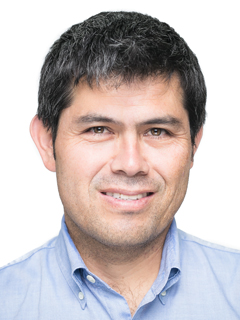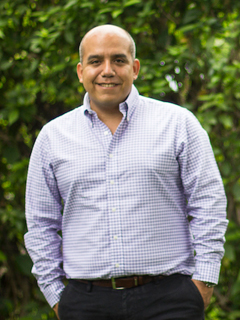 |
Antonio Bernabe- Ortiz, MD. MPH, PhD
Associate Researcher and Deputy Director, CRONICAS, Center of Excellence in Chronic Diseases, Universidad Peruana Cayetano Heredia
CRONICAS, Center of Excellence in Chronic Diseases, Universidad Peruana Cayetano Heredia
As Research Professor and Epidemiologist, he currently works in the Unit of Epidemiology and in CRONICAS, one of the Centers of Excellence in Chronic Diseases, at the Universidad Peruana Cayetano Heredia. His training is based on sexual and reproductive health, including HIV and STIs, as well as other infectious diseases such as tuberculosis and hepatitis B as his publications demonstrate. This work allowed him to gain a strong base of knowledge in epidemiological methods for population-based and observational studies and biostatistics for intervention studies. He has also been part and led the Data Safety Monitoring Board of different clinical trials and performed different types of statistical analysis. He has a strong background in biostatistics and epidemiology, as well as his experience working in CRONICAS.
His work demonstrates his interest in research methods, especially in the area of epidemiology and biostatistics. The use of different research methods allowed him to publish issues of public health relevant not only to Peru but also in the United States. Although diverse in topics, his first publications, with several citations, describe the intent of use biostatistics to better understand the epidemiology of relevant issues.
Many of his publications during the last ten years are based on non-communicable diseases epidemiology in Peru. His focus of interest now is centered on hypertension, diabetes and obesity and is currently working on the publication of paper of the first cardiopulmonary cohort in Peru. In addition, the first cohort of migrants with more than 5 years of follow-up has been established in Peru. The information collected as well as the analysis performed has been useful to gain experience in implementation research in which he has been co-investigator and leader coordinator of a stepped wedge trial design to evaluate a salt substitute to reduce blood pressure at the population level.
|
 |
Amalia Pesantes
Research Associate
Dr. Pesantes is a medical anthropologist interested in research relevant to improve the quality of care provided for patients from vulnerable groups. She is a researcher at CRONICAS, Center of Excellence in Chronic Conditions based at the Universidad Peruana Cayetano Heredia, Peru. Some of the research projects she is involved are aimed at understanding health systems performance in rural areas and poor urban settings in Lima regarding access to health care for people with chronic conditions.
Both, her PhD dissertation and Master’s thesis studied barriers to health care access for two different vulnerable populations. Her Phd thesis focused on a grassroots initiative to provide culturally appropriate heath care for indigenous people in the Peruvian Amazon and her master’s thesis studied the efforts of parents of undocumented uninsured children in Pittsburgh to secure timely health care for their children. These two studies provided the opportunity to look in a systematic way at the experiences of indigenous people and Latino immigrants to access health care services in systems that were not prepared to take into account their specific social characteristics. Both studies remarked the importance of studying health care access problems in the context of broader social inequalities supported by stigma and discrimination.
Her previous research experience conducting qualitative research among vulnerable populations in combination with training studying social aspects of chronic condition management have prepared Dr. Pesantes to develop a research proposal focused on the implications of lifelong treatment among people living with HIV. HIV management share many commonalities with other chronic conditions. They all require lifelong treatment, regular access with health care facilities and the introduction of changes in everyday life. She also recently completed a systematic review that identifies and characterizes interventions directed at enhancing resiliency to manage Type 2 diabetes and hypertension in vulnerable populations.
|
 |
Jaime Miranda
Research Professor, School of Medicine & Director, CRONICAS Center of Excellence in Chronic Diseases
Dr. Miranda is the Director of the CRONICAS Center of Excellence in Chronic Diseases, established with the support of the NHLBI. The Center is supported by major research agencies including NIH, Wellcome Trust, Medical Research Council, Grand Challenges Canada, and International Development Research Center. Their ongoing research portfolio includes several large-scale NIH-funded projects in which he participates as PI/co-PI (U01HL114180, R21TW009982) or co-I (U19MH098780). Their NIH -funded projects are directly related to the field of implementation science research and form part of the Global Alliance for Chronic Diseases, a coalition of funders and researchers committed to implementation science and scaling-up. They have a demonstrated track record testing technology-based interventions, exploring how best to capitalize on mHealth to bridge various unmet needs in low-income settings: ClinicalTrials.gov NCT01295216 for prehypertension (completed, published in Lancet Diabetes Endocrinol 2015), NCT02373592 for diabetic foot (currently enrolling, this study is part of the Global Alliance of Chronic Diseases, a platform where I frequently interact with other PIs on implementation science), plus two ongoing mHealth projects focused on mental health and co-morbidities.
|
 |
Cesar Ugarte
TB Research Unit Coordinator
In the last 10 years, after medical school, Dr. Ugarte has been working in Tuberculosis (TB) research, participating first as Research Assistant, Research Coordinator, then Research Associate, and since 2015 as TB Research Unit Coordinator at the Instituto de Medicina Tropical Alexander von Humboldt (IMTAvH) at the Universidad Peruana Cayetano Heredia (UPCH). In 2008 he completed a Master's in Epidemiology at the London School of Hygiene and Tropical Medicine (LSHTM) while investigating, with the support from a Master Fellowship from Wellcome Trust, the first longitudinal study looking at Metalloproteinases (MMPs) concentrations during TB treatment. As a researcher in Lima, Peru, he has worked in all the processes of a research project: writing, get IRB permission, enrolment, analysis and publication. In 2011 Dr. Ugarte received the support from a NIH Training Grant (ICOHRTA-Peru) to start his doctoral studies at Johns Hopkins Bloomberg School of Public Health (JHSPH), defending in December 2016 the topic of TB and Diabetes. The dissertation’s data collection was possible with the collaboration of a TB-Diabetes Consortium (TANDEM) which he is part of as a local PI in Peru. In 2013, he also received the support from the Fogarty Global Health Fellowship to investigate the role of MMPs in TB, TB-Diabetes and TB-HIV. Now, as a TB Research Unit coordinator his focus in diagnostic, TB´s comorbidities and other topics in TB research are part of his main interest.
|
 |
Cristina Guerra-Giraldez
Dr. Guerra-Giraldez is a full-time professor at the Universidad Peruana Cayetano Heredia (UPCH), School of Sciences. She earned B.Sc. and M.Sc. degrees in Biology. Between 1997 and 2005, via a Ph.D. studentship from the German Academic Exchange Service (DAAD) and a Wellcome Trust traveling postdoc grant, she dedicated to studying subcellular compartmentation, metabolism, and genetic regulation in single-cell parasites (trypanosomatids). These years of basic research on parasitic mechanisms increased her interest in the adaptations found in pathogens and in understanding their interactions with hosts, which can lead to solutions for infectious diseases. After a short stay at the University of Washington, including experimental research about virulence regulation in T. pallidum, she returned to Peru in 2007 and joined the School of Science at Cayetano Heredia. From 2010-2017 she led the immunology/molecular studies of Taenia solium for the Cysticercosis Working Group in Peru (CWGP) where she performed in vivo and in vitro studies on brain inflammation in close collaboration with the NIH. Through funding from the Peruvian Government, she now is in charge of a research group at UPCH. Her current focus is the regulation of development in T. solium.
|








